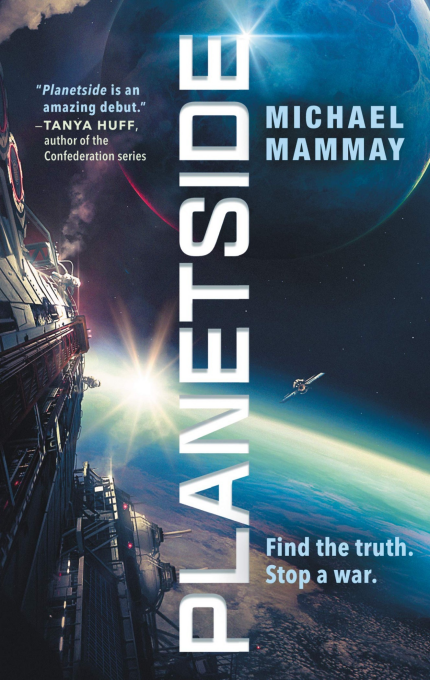Planetside (Planetside #1), by Michael Mammay

Planetside by Michael Mammay
My rating: 2 of 5 stars
This is going to be yet another difficult review. There’s no doubt: “Planetside” is suspenseful and exciting military science fiction. There’s also no doubt there are plot holes, loose ends and an ending that’s extremely problematic.
Let’s start at the beginning, though, at which Colonel Carl Butler, semi-retired of Space Command, is sent to the Cappa system by his superior and old acquaintance General Serata. This is where the trouble starts: Michael Mammay keeps hinting at the tour(s?) of duty, Butler completed in Cappa but we never learn what happened, why Butler drinks habitually, how he lost his daughter on planet Cappy and so much more.
We get to know that Butler is supposed to find out about the fate of the son of some SPACECOM hotshot but that’s it.
Early on in his investigation, Butler realises there’s a lot of weird business going on both “planetside” on Cappa and on the Cappa Base in its orbit. Since Butler’s primary “tactic” is to metaphorically bash in some doors if he can’t think of any real plan (and he usually can’t), he upsets a lot of people from different commands like Medical Command (MEDCOM) and some military intelligence service.
While his methods are questionable, it’s at least interesting to read. Sadly, General Serata’s “spy” is non-lethally taken out of the picture early on and, thus, never gets used. The station’s commander, Stirling, remains shady: He’s accused of knowing about the central issue – but Butler never follows up on that. Stirling’s second-in-command, Lex, suddenly knows a detail Butler never mentioned to her – and he remembers that dimly but also never acts upon that mystery.
Mac, Butler’s personal security detail, is an experienced soldier “worth his salt” and, thus, graced with an actual name. Most of the other soldiers remain nameless or get reduced to “G One” and “G Two”…
Several assassination attempts are made against Butler and never get resolved. Yes, the action on the planet is interesting but, honestly, content-wise highly unoriginal – we’ve seen it a billion times on TV, read it in a billion trashy sci-fi novels. I rolled my eyes quite a few times.
Also, the yellow-skinned slit-eyed indigenous (!) population on planet Cappa is dumb, generally evil and anthropomorphic and, of course, subdued or pacified… The few “rebels” are supposed to be “dealt with”. After all, the silver that humanity wants to extract from the planet is much more important than indigenous life…
None of that ever crosses Butler’s mind, though. He thinks of his daughter (never bothering the Cappans are most likely to have children, too), his wife whom he asks Serata to take care of should things go south for Butler (what about the Cappans’ wives?). No, Butler only worries about the exact range of his authority and why he was sent to Cappa.
Even when Butler finally realises why exactly he was sent on his mission – namely because Butler has no scruples whatsoever and is willing to do “whatever it takes” (to secure the silver and protect the “secret” that both Butler and Serata realise will get out anyway) – he doesn’t shy away.
On the contrary: Butler makes up his mind, doesn’t tell anyone what he’s up to and ruthlessly commits crimes much worse than anything anyone else did. His only worry is “containment” – knowing full well that this is impossible.
And that’s exactly where the book ends. No aftermath, no remorse, not the slightest hint at what happens next – nothing.
»Find the truth. Stop a war« the cover ominously says. A version of the truth is found and the war is stopped, yes. I never expected it to end the way it did, though, and this ending deeply upsets and appals me. It also destroys any desire to read any books by an author who basically states “might makes right”.
Yes, this is, fortunately, fiction but a kind of fiction that’s based upon and plays to the advantage of xenophobia, racism, genocide and the like. We’ve had enough of that in our non-fictional history.
Three stars for the literary work as such. One star for its ethics. That leads me to a guilty-feeling two stars out of five.
Ceterum censeo Putin esse delendam
View all my reviews